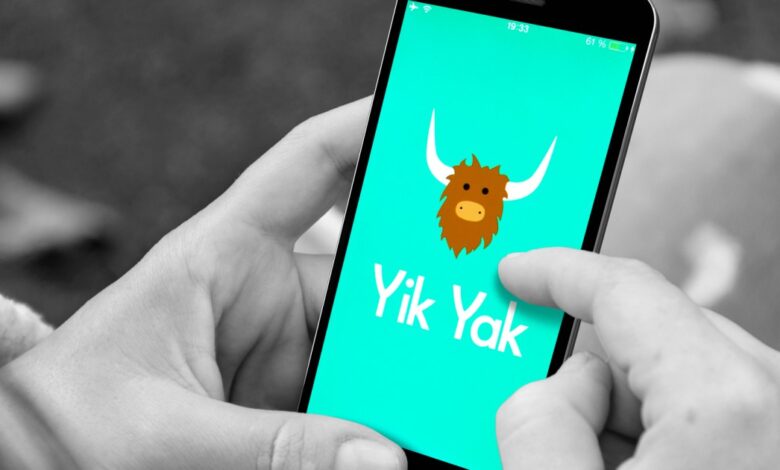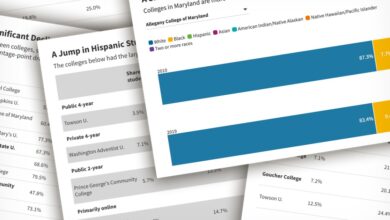What Colleges Should Know About the New Yik Yak

Yik Yak’s first iteration, popular with college students from 2013 to 2017, was fertile ground for cyberbullying, harassment, and even threats of bomb and gun violence. It was banned from at least half a dozen campuses, prompted legal action, and created headaches for administrators.
Touted as “a place to be authentic” and “connect with others nearby,” Yik Yak’s reprise could offer a new way for students to build community as they face a second fall semester disrupted by the pandemic. Or, critics fear, the app could sow division.
The new Yik Yak, which users in the United States can download in Apple’s App Store — an Android version is not yet available — operates on the same principles of anonymity and hyperlocality as the original. Anyone can post a “yak,” a short text post visible to others to comment on and either “upvote” or “downvote.” If a post is downvoted five times, it will be immediately removed — an automated form of content moderation.
But in Yak Yak’s first run, even if a yak was quickly downvoted and removed, it could often live on — and attract controversy — through screenshots shared on other social networks and by media outlets. College administrators fielded reports that Yik Yak was being used to share racist, homophobic, and misogynistic remarks, sometimes even targeted at individual students or faculty members. In the fall of 2014, students at Colgate University staged a sit-in protesting institutionalized racism, prompted in part by posts on Yik Yak. That same semester, three female professors at Eastern Michigan University discovered they were being insulted by students as they taught a class.
Once valued by investors at $400 million, Yik Yak shut down in 2017, with the mobile-payments company Square acquiring some of its engineering team and intellectual property.
This time around, the app features an extensive set of “Community Guardrails,” which set forth policies against bullying, bigotry, sexual harassment, privacy violations, and other inappropriate actions. There are also dedicated resource pages for mental health and staying safe.
The app’s new owners write on YikYakInc.com that they are a “small, independent team” that acquired redevelopment rights for Yik Yak in February. Their identities aren’t listed, and emails sent to a designated address for media inquiries went unanswered.
YikYakInc.com appears to be connected to Andrew White, whose LinkedIn and Twitter accounts said he was a product manager at Uloop, an online marketplace that helps students find jobs, housing, roommates, tutors, and more. White’s name and email address appear in the website’s publicly available YikYakInc.com metadata, as does a link to an app White developed. Tyler Droll, one of the app’s cofounders, referred questions to the same email address when asked to comment on Yik Yak’s relaunch. (Brooks Buffington, the other co-founder, did not respond to a request for comment.)
White, too, did not respond to emails or phone calls from The Chronicle this week. By Thursday afternoon, White’s LinkedIn and Twitter profiles had been taken down. (Before it was deactivated, White’s Twitter account had posted a retweet from a user who wrote, “They should bring YikYak back for the second quarantine.”)
A phone number listed on Yik Yak’s privacy-policy page went to a voicemail recording for Greg Edson, another Uloop employee. A message left at that number was not returned.
That’s the question Ioana Literat found herself pondering when she heard the app was back. The scholar of participatory online cultures wrote a 2017 paper, with a grad student, criticizing Yik Yak’s design.
“I would be lying if I said I wasn’t concerned,” said Literat, an associate professor of communication, media, and learning-technologies design at Columbia University’s Teachers College. Given that Yik Yak was “problematic” in its original form, and factoring in the “extremely polarized, politically charged” sociopolitical context of today, Literat said, the app could wind up reinforcing inequities, cyberbullying, and polarization.
“I struggle to find positive consequences that might come out of it,” Literat said, “and usually I’m very optimistic about social media.”
Literat’s 2017 research sought to determine whether Yik Yak users were to blame for the problematic content or whether there was “something inherently toxic” about the app itself. “In the case of Yik Yak, it’s this combination between anonymity, hyper-location, and endorsements from other users that make it particularly potentially problematic,” she said.
Joseph E. Abboud tends to agree. An associate at the law firm Katz, Marshall & Banks, he worked on a team that sued the University of Mary Washington on behalf of a campus feminist group and several individual students who were the targets of derogatory comments and threats of violence on Yik Yak. Some posts included their location on campus.
“It just invites students to put out their worst and most extreme thoughts, because they feel that they are protected by anonymity, but they also know that they’re going to have an audience of people who are familiar with what’s going on in the community,” Abboud said. “In the college environment, it leads to a piling on. The founders of Yik Yak should have seen it coming. After the app launched, they saw it happening all over the country, and yet the actions they tried to take to tamp down on it were just ineffective.”
Abboud’s clients at Mary Washington eventually notched a victory in the U.S. Court of Appeals for the Fourth Circuit, which held that colleges must investigate and take action against anonymous online sex-based harassment and threats.
How are they to do that? There are some possibilities. On the technical side, colleges can review data traffic, possibly in conjunction with Yik Yak or law enforcement, and they can also conduct a more “traditional investigation” by talking to students. But “one of the dangers of Yik Yak is that schools might not have the ability to actually get to the bottom of every offending and threatening message,” Abboud said, “which is why the re-emergence of Yik Yak is a frightening prospect.”
While users can also report posts for review by Yik Yak, Abboud said it’s unlikely the app’s team will be able to police all that traffic, noting that even major tech companies like Facebook and Twitter have struggled to do so. A third-party moderator, he added, is unlikely to have knowledge of campus-specific context or lingo that might be necessary to determine whether a yak violates the rules.
Blacklisting the app from the campus Wi-Fi didn’t preclude students from using it, as The Chronicle reported at the time. They could still access it via their own cellular networks, and they posted sarcastic comments about the ban’s seeming futility.
But the ban “was an important symbolic gesture for the college to make,” Stephanie Chipman, Illinois’ vice president for external relations, told The Chronicle this week.(Chipman was vice president for enrollment and marketing when the ban was instituted in 2016.)
And it worked: Fewer yaks — and fewer negative ones — were posted after the ban. “What we had really hoped to do was open the discussion, illuminate the problematic rules of Yik Yak around anonymity, and to protect the students being targeted, and in that way it was an absolute success,” Chipman said.
Will the ban stay in place for the new Yik Yak? That’s still to be determined. Chipman said administrators will discuss the issue with student-government leaders when they arrive on campus. “The majority of the students on campus were not in college in 2016, so it’s going to be a new conversation and a new opportunity for us to discuss the power of discourse and community and civility,” she said.
Heiberger, associate dean for academics and student success at South Dakota State University, said any conversation about how to handle Yik Yak should take into consideration that much of its content is “pretty benign.” In the last week, much of the chatter he’s seen on Yik Yak had to do with a mobile miniature-golf course that was recently installed near campus and with praise for a local ice-cream shop — “really positive things, about real human interaction and getting people connected.”
Heiberger sees in the app an opportunity for faculty members and administrators to learn about their students. “Yik Yak scares a lot of people because it’s anonymous, because we don’t know how to interact there, we don’t know what could happen. But if we draw that hard line” and ban the app, he said, “we don’t engage.” He recommends that higher-ed professionals start by downloading the app and “lurking,” reading posts to get a sense of what students are talking about and remembering that the Yik Yak user base may not be a representative subset of the campus population.
In fact, in Yik Yak’s first run, it tended to amplify the voices of wealthy white students involved in Greek life, one researcher found. Francesca Tripodi, an assistant professor in the University of North Carolina at Chapel Hill’s School of Information and Library Science, studied Yik Yak’s use at one large public institution as part of her doctoral dissertation. She found that the downvoting mechanism — the one intended to purge harmful content — was often used against sentiments expressed by, say, Black or LGBTQ+ students, that others disagreed with.
“It was combating cyberbullying, but it was also silencing people who already felt like they didn’t belong on the campus,” said Tripodi. “The app was creating this sense of community for people who already had a pretty good sense of community on the physical campus.”
Student-athletes or students on scholarship, she said, “never posted anything to Yik Yak because they didn’t trust that it was actually anonymous, and they were concerned that if they voiced something defamatory or got found out for posting something, they had a lot to lose.” But the risk of posting a controversial yak was much lower for students whose parents might have been paying their room and board. “This idea that you’re safe to say whatever you want,” Tripodi said, “is largely contingent on your existing place in society.”
Tripodi did encounter some positive uses of Yik Yak — students who expressed suicidal ideation were quickly met with an outpouring of support, with some people posting their phone numbers and email addresses, encouraging their peers to reach out if they needed help. But even those reactions were limited: Only students who had already established a sense of connection and safety on Yik Yak were likely to make such vulnerable admissions, Tripodi said.
The same principles will probably hold today, she said.
“For those students who already feel isolated, this app has the potential to further isolate those persons, not only because they see hateful comments, but also because their contributions aren’t valued within the community.”
Literat, at Teachers College, is skeptical that Yik Yak will become the phenomenon it once was. As a social-media researcher, she spends most of her time these days on video-based platforms like TikTok, which hold more sway than stripped-down interfaces like Yik Yak (which doesn’t allow photos). She doesn’t anticipate TikTok users making the jump to Yik Yak, particularly if the latter app doesn’t attract a critical mass of users to make it appealing.
Ultimately, Literat thinks Yik Yak’s greatest value to this generation of students is its “more problematic functions,” like anonymity — there aren’t any contemporaneous anonymous social-media apps being widely used by college students.
It’s for that reason that Literat, for one, hopes the new version of Yik Yak doesn’t take hold on college campuses this fall.
Dan Bauman contributed reporting.
Source link






